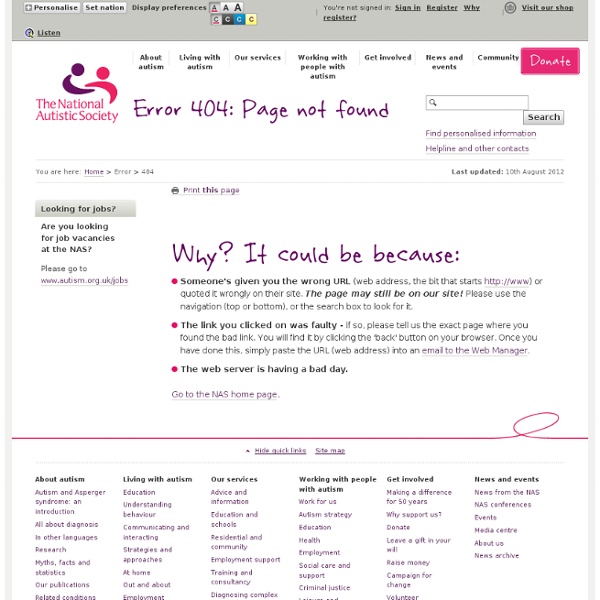



http://www.autism.org.uk/global/content/error/404.aspx
Social skills training - children, effects, therapy, adults, person, people, used, medication Photo by: Kheng Guan Toh Definition Social skills training (SST) is a form of behavior therapy used by teachers, therapists, and trainers to help persons who have difficulties relating to other people. Purpose Goals A major goal of social skills training is teaching persons who may or may not have emotional problems about the verbal as well as nonverbal behaviors involved in social interactions. Social skills in young children How can he be so clever but not know when to stop talking?How can he be so selfish when he is playing? He is the first to tell others off for being so. Is she really rude or does she just not understand? You may have asked yourself these questions while watching your young child with an autism spectrum disorder (ASD) try to interact with their peers.
Asperger syndrome Asperger syndrome (AS), also known as Asperger disorder (AD) or simply Asperger's, is an autism spectrum disorder (ASD) that is characterized by significant difficulties in social interaction and nonverbal communication, alongside restricted and repetitive patterns of behavior and interests. It differs from other autism spectrum disorders by its relative preservation of linguistic and cognitive development. Although not required for diagnosis, physical clumsiness and atypical (peculiar, odd) use of language are frequently reported.[1][2] The syndrome is named after the Austrian pediatrician Hans Asperger who, in 1944, studied and described children in his practice who lacked nonverbal communication skills, demonstrated limited empathy with their peers, and were physically clumsy.[3] The modern conception of Asperger syndrome came into existence in 1981[4] and went through a period of popularization,[5][6] becoming standardized as a diagnosis in the early 1990s. Classification Causes
National Association for Sport and Physical Education NASPE Home : : Contact Us : : Join Top News AAHPERD Partners with First Lady's New Let's Move Active Schools Initiative Register for 2013 AAHPERD Convention See the Featured Speakers Sam Kass from White House Set to Speak at NASPE General Session NASPE Releases 2nd Infographic Physical Activity in Schools List Of All The Site's Articles This page lists all the site's articles. If you find it a tad overwhelming you could always check out the shorter list of the site's core articles. Here are some other quick suggestions to take the edge off.
Teaching Social Skills to Children with Autism - Lovaas Blog - ABA Treatment for Children with Autism - Lovaas By Vince LaMarca, M.A., BCBA, EditorLovaas Institute - Indianapolis Teaching social skills to children with autism is an area of behavioral treatment that is continuously evolving, perhaps more than any other area. The Journal of Applied Behavior Analysis alone frequently includes articles discussing the teaching of interactive play skills, the development of creativity and spontaneity, and the development of conversational skills.
Asperger Syndrome Information Page Asperger syndrome (AS) is a developmental disorder. It is an autism spectrum disorder (ASD), one of a distinct group of neurological conditions characterized by a greater or lesser degree of impairment in language and communication skills, as well as repetitive or restrictive patterns of thought and behavior. Other ASDs include: classic autism, Rett syndrome, childhood disintegrative disorder, and pervasive developmental disorder not otherwise specified (usually referred to as PDD-NOS). Unlike children with autism, children with AS retain their early language skills. Ipad Apps for Physical Education In preparation for having some iPads at our disposal next term I’ve done some research into available apps and possible uses within Physical Education. I have only managed to trial free ones so far but will be purchasing some paid apps in Sept. In order to avoid wasting any money come September I’ve compiled a list from searching the app store and thinking through certain uses. It is by no-means exhaustive and as such please feel free to supplement the list and add any comments.
How to Become A Social Badass I’m tired of being a little girl when it comes to meeting new people. To rid myself and others of this pathetic habit, I’ve put together a step-by-step guide on overcoming social anxiety taking from other articles, books and my own experimentation. So what is a ‘social badass,’ you ask? A social badass is an individual who dominates social situations without anxiety or trepidation of any kind. The Basics
Wendy Rinaldi Books for Professionals in Special Education Welcome! Click on one of the scheme titles below for more information, illustrations and prices. Click for Training Information Check out our Notice Board to find out the latest news Click for Testimonials WENDY RINALDI® 2014 a all rights reserved